=== TRANSITION [2011-2016] ===
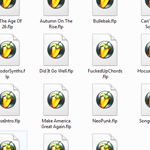 A lot of the music I'd been working on in 2011 didn't make it to Newgrounds. Some of which were submitted later on, such as Between Nightmare And Dreams and Breaking Free. At the time, I felt like this was the pinacle of what I was capable of; A lot of it was made using fresh samples, personal presets and recordings (fieldrecordings, but also snippets and vocal pieces). Furthermore, most of it had hints of dubstep, ambient, electronic music and I guess jazz too. Maybe I should go and finish whatever pieces I'd been working on. "Imaginary Heroes" for example, or "If You Could See What I Can See", "Memories of Pokémon", "Sinister", "22:22" and "Eyecontact". With the year of 2011 coming to and end, I felt incredibly inspired by my delusions as a 16-year old and wanted to write an album, wanting to keep all of this stuff private until my release on Bandcamp. By 2012 I had moved out of my parents' home, and mainly worked on songs for this album, which explains why I barely spent any time uploading songs to Newgrounds. The saddest part of it all is this album is STILL in progress. I ascribe this to my complicated musical process where I try my best to set an atmosphere by looking at pictures and listening to songs, so as to "become" whoever I was in those days and work from there.
A lot of the music I'd been working on in 2011 didn't make it to Newgrounds. Some of which were submitted later on, such as Between Nightmare And Dreams and Breaking Free. At the time, I felt like this was the pinacle of what I was capable of; A lot of it was made using fresh samples, personal presets and recordings (fieldrecordings, but also snippets and vocal pieces). Furthermore, most of it had hints of dubstep, ambient, electronic music and I guess jazz too. Maybe I should go and finish whatever pieces I'd been working on. "Imaginary Heroes" for example, or "If You Could See What I Can See", "Memories of Pokémon", "Sinister", "22:22" and "Eyecontact". With the year of 2011 coming to and end, I felt incredibly inspired by my delusions as a 16-year old and wanted to write an album, wanting to keep all of this stuff private until my release on Bandcamp. By 2012 I had moved out of my parents' home, and mainly worked on songs for this album, which explains why I barely spent any time uploading songs to Newgrounds. The saddest part of it all is this album is STILL in progress. I ascribe this to my complicated musical process where I try my best to set an atmosphere by looking at pictures and listening to songs, so as to "become" whoever I was in those days and work from there.
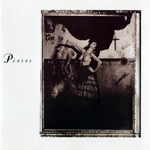 Irrelevant to the surface, I watched the movie Scott Pilgrim in 2012. I thought it was awesome and later learned it was based off a comic. I got online and started reading the thing. After finishing each volume, I found a list of songs Bryan Lee o'Malley had been listening to while working on the pages. Figuring the man had a fantastic taste in music, I started listening to (alternative) rock more than ever, eventually stumbling upon a band that changed my life in a way; The Pixies. I thought their album Surfer Rosa was weird on my first listen, but their songs slowly crept into my brain. I began to fall for the crude charm and hispanic influences. I believe it was David Bowie who once compared the Pixies to The Velvet Underground; "Not many people bought their music, but those who did started a band." I was very self-aware about my music when I first heard the Pixies for myself, so I didn't have the confidence to start a band. Instead, it opened my mind to unlimited possibilities I hadn't thought possible before. Their happy, straightforwards post-punk rhythms, alternating time signatures, fuzz-induced guitar wails with unconventional amelodic riffs, yowling vocals and attention-grabbing lyrics in one way or another all inspired me to do something similar. It definitely fueled my inspiration to write lyrics and - who knows? Maybe do more vocals. Sometimes I find myself wishing I could scream like Black Francis does haha.
Irrelevant to the surface, I watched the movie Scott Pilgrim in 2012. I thought it was awesome and later learned it was based off a comic. I got online and started reading the thing. After finishing each volume, I found a list of songs Bryan Lee o'Malley had been listening to while working on the pages. Figuring the man had a fantastic taste in music, I started listening to (alternative) rock more than ever, eventually stumbling upon a band that changed my life in a way; The Pixies. I thought their album Surfer Rosa was weird on my first listen, but their songs slowly crept into my brain. I began to fall for the crude charm and hispanic influences. I believe it was David Bowie who once compared the Pixies to The Velvet Underground; "Not many people bought their music, but those who did started a band." I was very self-aware about my music when I first heard the Pixies for myself, so I didn't have the confidence to start a band. Instead, it opened my mind to unlimited possibilities I hadn't thought possible before. Their happy, straightforwards post-punk rhythms, alternating time signatures, fuzz-induced guitar wails with unconventional amelodic riffs, yowling vocals and attention-grabbing lyrics in one way or another all inspired me to do something similar. It definitely fueled my inspiration to write lyrics and - who knows? Maybe do more vocals. Sometimes I find myself wishing I could scream like Black Francis does haha.
 2013 was an interesting year. Being a computer repairsman at the time, by some stroke of luck I rolled into a smalltime radio business. Can't say I learned many new things about music there but it has taught me something else about education: Ideally, college grants knowledge, experience, skills and social connections. But all of these things are more important than papers of approval, and ironically they can all be attained without going to college (although the turnout of autodidacticism can be very lopsided). I don't think I would recommend the same mindset to anyone without a creative vision (Go to a university if you want to be a doctor or something). My path in life has been an unconventional one however, so this realisation was very reassuring.
2013 was an interesting year. Being a computer repairsman at the time, by some stroke of luck I rolled into a smalltime radio business. Can't say I learned many new things about music there but it has taught me something else about education: Ideally, college grants knowledge, experience, skills and social connections. But all of these things are more important than papers of approval, and ironically they can all be attained without going to college (although the turnout of autodidacticism can be very lopsided). I don't think I would recommend the same mindset to anyone without a creative vision (Go to a university if you want to be a doctor or something). My path in life has been an unconventional one however, so this realisation was very reassuring.
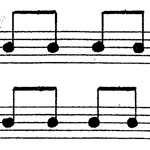 A piece of outstanding criticism from 2013 came from my best friend. It wouldn't be the first time someone pointed out my biggest composition flaw is the bass, but through all this time it was somehow quite difficult to pinpoint the exact reason why it sucked. Nowadays I've realized there's a number of reasons for it (most of which have made it into my notebook of pointers): One such reason is the bass instrument I pick always sounds basic, harsh, electronic and oftentimes distorted. This gives your song an aggressive undertone, which isn't always suited for the type of song you're doing. Prodigy, Daft Punk and Dubstep in general definitely steered me in that direction. The next reason was all about melodical prowess. My basslines had the melodic implication of lead melodies - sometimes even utilizing over 2 octaves of melodic span - which made them too distracting. On top of that, many of the notes were sustained, barely leaving any space for rhythmical purposes. I'm pretty sure this happened partly because I enjoyed the smooth sound of sine basslines commonly found in drum&bass. I also really love Röyksopp's Vision One which uses sustained bass notes. The other reason would be my discomfort with staccato 8/8 basslines. Even though they befit a composition sometimes, I started avoiding them years ago as I found they were lazy (they're one of the key characteristics of my old work). At some point I started observing songs with excellent basslines and found out something really useful, (although this is genre-dependent); It may be no secret that basslines are accompanied by different instruments but if you listen closely, sometimes there's different instruments that help assist the bass by making it "groove". I like to call this a "supporting melody." A great example would be the funky guitar chucks on Daft Punk's Voyager, or the electric piano on School by Calvin Harris. It pretty much serves as backup; It doesn't really matter what the bass is doing as long as something's there to groove along with it. Then again I would not advice myself to use this method too often. Bass instruments excel at their monophonicity and I much prefer to have a polyphonic instrument leading the composition. Chords, you see?
A piece of outstanding criticism from 2013 came from my best friend. It wouldn't be the first time someone pointed out my biggest composition flaw is the bass, but through all this time it was somehow quite difficult to pinpoint the exact reason why it sucked. Nowadays I've realized there's a number of reasons for it (most of which have made it into my notebook of pointers): One such reason is the bass instrument I pick always sounds basic, harsh, electronic and oftentimes distorted. This gives your song an aggressive undertone, which isn't always suited for the type of song you're doing. Prodigy, Daft Punk and Dubstep in general definitely steered me in that direction. The next reason was all about melodical prowess. My basslines had the melodic implication of lead melodies - sometimes even utilizing over 2 octaves of melodic span - which made them too distracting. On top of that, many of the notes were sustained, barely leaving any space for rhythmical purposes. I'm pretty sure this happened partly because I enjoyed the smooth sound of sine basslines commonly found in drum&bass. I also really love Röyksopp's Vision One which uses sustained bass notes. The other reason would be my discomfort with staccato 8/8 basslines. Even though they befit a composition sometimes, I started avoiding them years ago as I found they were lazy (they're one of the key characteristics of my old work). At some point I started observing songs with excellent basslines and found out something really useful, (although this is genre-dependent); It may be no secret that basslines are accompanied by different instruments but if you listen closely, sometimes there's different instruments that help assist the bass by making it "groove". I like to call this a "supporting melody." A great example would be the funky guitar chucks on Daft Punk's Voyager, or the electric piano on School by Calvin Harris. It pretty much serves as backup; It doesn't really matter what the bass is doing as long as something's there to groove along with it. Then again I would not advice myself to use this method too often. Bass instruments excel at their monophonicity and I much prefer to have a polyphonic instrument leading the composition. Chords, you see?
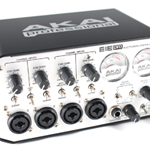 Anyway, ever since I had moved into my own place, I had trouble thinking of where to put either of my synthesizers. After my Juno-D and Microkorg had been collecting dust for two full years, in 2014 I finally decided to build a little cabinet for them to sit on. This allowed me to use them as midi-controllers again. Later that year, I bought an audio interface after much deliberation: The AKAI EIE Pro. I was now able to do what I've been wanting to do since I first got my Juno-D, which is to record myself playing the thing. It gave my songs an interesting turn! All these years I'd been using VST and soundfonts to simulate (electric) pianos. They were of shitty quality, had a stiff quantized feel about them and were very Fortisimo/staccato as well. Recording from a synthesizer felt way more dynamic! I especially enjoy the charm of their slightly flawed dynamics. They add character and organity which makes music pop!
Anyway, ever since I had moved into my own place, I had trouble thinking of where to put either of my synthesizers. After my Juno-D and Microkorg had been collecting dust for two full years, in 2014 I finally decided to build a little cabinet for them to sit on. This allowed me to use them as midi-controllers again. Later that year, I bought an audio interface after much deliberation: The AKAI EIE Pro. I was now able to do what I've been wanting to do since I first got my Juno-D, which is to record myself playing the thing. It gave my songs an interesting turn! All these years I'd been using VST and soundfonts to simulate (electric) pianos. They were of shitty quality, had a stiff quantized feel about them and were very Fortisimo/staccato as well. Recording from a synthesizer felt way more dynamic! I especially enjoy the charm of their slightly flawed dynamics. They add character and organity which makes music pop!
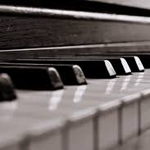 At this point it may seem that things were looking up for me, having come such a long way. Yet it took me very long to get here, and I nearly experienced a breakdown early in 2015 when I found out my guitarist friend (yes, the very same) had seemingly surpassed my skills at playing the piano. This in turn led me to reflect upon my musical road - eventually feeling conflicted about the keyboard lessons I took 17 years ago. I beat myself up about the fact that I should have learned the piano instead, but keyboard lessons were also the main reason I've gotten into actual music production at all. Discontinueing my lessons all those years ago, I've assimilated skills from experimentation, did very little research and barely practiced proper technique. I was good at chords for instance, but didn't realize the importance of scales. As such I didn't see myself improve at all and even felt like I deteriorated until I could not bear to call myself as a musician any longer. Despite the fact that this was an obvious lie, my attention shifted to other passions, such as animation. It was somewhere in October of that same year when I attended a small band-fest with one my colleagues from the radio. If anything, it made me very restless... I realized I wanted to be up on that stage! It took me a few days to realize what reason I had to squander my talents; I was bored - the instrument I played bored me. I kept dreaming of playing the guitar, ukelele, saxophone, violin, trumpet... anything to spice it up a bit! It also crossed my mind that bands often have no need for keys! After that I promised myself to do either of these things: A) Get piano lessons or B) Learn to play guitar.
At this point it may seem that things were looking up for me, having come such a long way. Yet it took me very long to get here, and I nearly experienced a breakdown early in 2015 when I found out my guitarist friend (yes, the very same) had seemingly surpassed my skills at playing the piano. This in turn led me to reflect upon my musical road - eventually feeling conflicted about the keyboard lessons I took 17 years ago. I beat myself up about the fact that I should have learned the piano instead, but keyboard lessons were also the main reason I've gotten into actual music production at all. Discontinueing my lessons all those years ago, I've assimilated skills from experimentation, did very little research and barely practiced proper technique. I was good at chords for instance, but didn't realize the importance of scales. As such I didn't see myself improve at all and even felt like I deteriorated until I could not bear to call myself as a musician any longer. Despite the fact that this was an obvious lie, my attention shifted to other passions, such as animation. It was somewhere in October of that same year when I attended a small band-fest with one my colleagues from the radio. If anything, it made me very restless... I realized I wanted to be up on that stage! It took me a few days to realize what reason I had to squander my talents; I was bored - the instrument I played bored me. I kept dreaming of playing the guitar, ukelele, saxophone, violin, trumpet... anything to spice it up a bit! It also crossed my mind that bands often have no need for keys! After that I promised myself to do either of these things: A) Get piano lessons or B) Learn to play guitar.
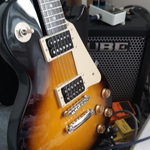 The year ended. With the coming of 2016 I moved into a new place. One of the first things I did was backup my projects and work on a new way to organize my files. This included a new naming system for my samples and a quality evaluation on top of that, so this took a very long time for me to do. I also deleted/added new VST. More importantly though, I read up a lot on guitars. Wood types, body types, string types, bridge types, neck lengths, pickups, whammy bars... One website accurately described how each individual piece of the guitar influenced a guitar's destinctive sound, which helped me pinpoint what I wanted, eventually assembling the exact guitar that I wanted in my mind. Of course, hearing is believing. I went to a music store where a couple of guitars were demonstrated. After hearing the clean single coils of the strat and telecasters, the raging squeals of an SG, and the slightly warm reverb of an open body guitar (which I would really love to own), I went with a model that seemed like a winner from the very beginning: The affordable Epiphone Les Paul 100. I've made a habit of playing it everyday since I got it, which is approximately 8 months now.
The year ended. With the coming of 2016 I moved into a new place. One of the first things I did was backup my projects and work on a new way to organize my files. This included a new naming system for my samples and a quality evaluation on top of that, so this took a very long time for me to do. I also deleted/added new VST. More importantly though, I read up a lot on guitars. Wood types, body types, string types, bridge types, neck lengths, pickups, whammy bars... One website accurately described how each individual piece of the guitar influenced a guitar's destinctive sound, which helped me pinpoint what I wanted, eventually assembling the exact guitar that I wanted in my mind. Of course, hearing is believing. I went to a music store where a couple of guitars were demonstrated. After hearing the clean single coils of the strat and telecasters, the raging squeals of an SG, and the slightly warm reverb of an open body guitar (which I would really love to own), I went with a model that seemed like a winner from the very beginning: The affordable Epiphone Les Paul 100. I've made a habit of playing it everyday since I got it, which is approximately 8 months now.
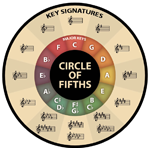 Upholding the format of these musings I was taken all across Newgrounds on the lookout for interesting new quotes to add. Through the myriad of musicians I found a few people discussing the practice of chord theory, which is something I'm only recently experimenting with. So far I have researched a couple of my favorite songs and I find it very useful for personal compositions that have run into a dead end. In a way it's like the lens of truth from Zelda, as it shows new possibilities when before there were none. Other benificial composition methods comprised of disecting songs and labeling their segments with according song structure terminologies. This was a bit of a throwback to my keyboard lesson days. It teaches a lot about how and when to use a verse or chorus, but I was hoping it would reveal more about bridges, intros and outros - save for all the segments I didn't have proper naming for - but alas. Even more recent is my research about instrument timbres. 99% of the instruments I use are synthesized and made to reach pitches otherwise thought to be impossible. Tubas don't play at C6 and violins don't go C2, neither is a piano going to sound great when you play the lower keys with a bass in the mix. Common sense! But admittedly it is easy to overlook when all you see is grids and bars. For future compositions I'll have to keep melodic span in mind and think over my timbres. Not in favor of the mix, but the composition.
Upholding the format of these musings I was taken all across Newgrounds on the lookout for interesting new quotes to add. Through the myriad of musicians I found a few people discussing the practice of chord theory, which is something I'm only recently experimenting with. So far I have researched a couple of my favorite songs and I find it very useful for personal compositions that have run into a dead end. In a way it's like the lens of truth from Zelda, as it shows new possibilities when before there were none. Other benificial composition methods comprised of disecting songs and labeling their segments with according song structure terminologies. This was a bit of a throwback to my keyboard lesson days. It teaches a lot about how and when to use a verse or chorus, but I was hoping it would reveal more about bridges, intros and outros - save for all the segments I didn't have proper naming for - but alas. Even more recent is my research about instrument timbres. 99% of the instruments I use are synthesized and made to reach pitches otherwise thought to be impossible. Tubas don't play at C6 and violins don't go C2, neither is a piano going to sound great when you play the lower keys with a bass in the mix. Common sense! But admittedly it is easy to overlook when all you see is grids and bars. For future compositions I'll have to keep melodic span in mind and think over my timbres. Not in favor of the mix, but the composition.
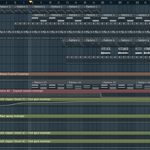 Other than that there's many musical techniques I refrain from using nowadays because I have come to think of them as amateurish or clishé, which is a huge shame. Trying to avoid these patterns - I found over time - has not improved my songs, but has only limited my possibilities! I'll try to see if I can list them all: The effects it's had on my choice of instruments isn't all that bad (I find saw basslines and supersaws overdone, refrain from using factory presets and sparsely use portamento. Sidechain compression I only use in moderation and arpeggiators I barely find use for), it has however mildly affected the way I treat soundeffects (I barely use vocoders despite me owning a Microkorg and mostly treat flangers and phasers as deejay toys. Oscillators are only cool in moderation). More worrisome are melodic and rhythmical patterns (Rhythmic chords on the piano are the worst. Raggea skanks are also pretty terrible. Staccato basslines that are more rhythmic than melodic are also a big no) and the steering of my composition (The biggest musical clishé to avoid is the melodic reprise. I also never deliberately follow classic song structure rules which is why none of my recent songs have an actual chorus, and especially dislike to compose songs which use major and minor chords exclusively). Many of these techniques I've used in older songs and they're not necessarily fruitless but frankly I got sick and tired of how they sound and moved on. My bias is unfair though, especially when it comes to rhythmical patterns and composition methods. Subsequently, these are the reasons why so many of my unfinished projects have been reduced to short looping submissions in the past years. Many of my favorite musicians make use of the methods I mentioned before, so I think it's time to bring them back myself!
Other than that there's many musical techniques I refrain from using nowadays because I have come to think of them as amateurish or clishé, which is a huge shame. Trying to avoid these patterns - I found over time - has not improved my songs, but has only limited my possibilities! I'll try to see if I can list them all: The effects it's had on my choice of instruments isn't all that bad (I find saw basslines and supersaws overdone, refrain from using factory presets and sparsely use portamento. Sidechain compression I only use in moderation and arpeggiators I barely find use for), it has however mildly affected the way I treat soundeffects (I barely use vocoders despite me owning a Microkorg and mostly treat flangers and phasers as deejay toys. Oscillators are only cool in moderation). More worrisome are melodic and rhythmical patterns (Rhythmic chords on the piano are the worst. Raggea skanks are also pretty terrible. Staccato basslines that are more rhythmic than melodic are also a big no) and the steering of my composition (The biggest musical clishé to avoid is the melodic reprise. I also never deliberately follow classic song structure rules which is why none of my recent songs have an actual chorus, and especially dislike to compose songs which use major and minor chords exclusively). Many of these techniques I've used in older songs and they're not necessarily fruitless but frankly I got sick and tired of how they sound and moved on. My bias is unfair though, especially when it comes to rhythmical patterns and composition methods. Subsequently, these are the reasons why so many of my unfinished projects have been reduced to short looping submissions in the past years. Many of my favorite musicians make use of the methods I mentioned before, so I think it's time to bring them back myself!
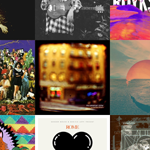 Speaking of favorite songs, these past 5 years I've made it a mission to broaden my musical horizons and familiarized myself with maybe 50 different albums per year? However, I'm not sure I've found many musicians that I deem influential enough to help evolve my musical style. I mentioned Danger Mouse in my last entry. Other musicians I started listening to around that time were Boards Of Canada and Zoot Woman. Beck may have had a lyrical effect on me. I love how his words can drone and carry a song, allowing for repetitive musical patterns to carry on and on. Even when his songs feel strangely quantized sometimes, they're never stiff and maintain a rugged, band-like appeal. During 2012 I finally started checking out a bunch of Beatles albums. I also found out about Manabu Namiki, who wrote soundtracks for many CAVE bullethell games. Among the speed and urgency, his songs follow great chords and have an overall floaty appeal with soothing pads and synths that seem to wash away your worries. 2013 was by far the best year. I started listening to Frank Zappa, whose music borders on free jazz and is oddly genius. I also took more interest in Ween, a band which is very worthy of praise. They're a strange band, frivolous of nature and dabbling in many different genres which I found off-putting at first. While it's hard to define Ween songs, a playful nature shimmers through each one of their songs and functions as a reminder that music should always be fun. There's also the Pixies (as discussed earlier) of course, and that's about it for this year. I don't think I came across any noteable bands in 2014, except for maybe the J-Pop group Perfume. Their melodic hooks are fantastic! As a final mention I'll give you Mac deMarco whom I gave a proper listen to in 2015. His jangle tunes have a very distinctive omtimistic sound which I like to compare to the mental effects of sunlight (Could very well be because his songs are reminiscent of Here Comes The Sun by the Beatles). Of course I came across many more musicians, but these were the ones I felt most influenced by.
Speaking of favorite songs, these past 5 years I've made it a mission to broaden my musical horizons and familiarized myself with maybe 50 different albums per year? However, I'm not sure I've found many musicians that I deem influential enough to help evolve my musical style. I mentioned Danger Mouse in my last entry. Other musicians I started listening to around that time were Boards Of Canada and Zoot Woman. Beck may have had a lyrical effect on me. I love how his words can drone and carry a song, allowing for repetitive musical patterns to carry on and on. Even when his songs feel strangely quantized sometimes, they're never stiff and maintain a rugged, band-like appeal. During 2012 I finally started checking out a bunch of Beatles albums. I also found out about Manabu Namiki, who wrote soundtracks for many CAVE bullethell games. Among the speed and urgency, his songs follow great chords and have an overall floaty appeal with soothing pads and synths that seem to wash away your worries. 2013 was by far the best year. I started listening to Frank Zappa, whose music borders on free jazz and is oddly genius. I also took more interest in Ween, a band which is very worthy of praise. They're a strange band, frivolous of nature and dabbling in many different genres which I found off-putting at first. While it's hard to define Ween songs, a playful nature shimmers through each one of their songs and functions as a reminder that music should always be fun. There's also the Pixies (as discussed earlier) of course, and that's about it for this year. I don't think I came across any noteable bands in 2014, except for maybe the J-Pop group Perfume. Their melodic hooks are fantastic! As a final mention I'll give you Mac deMarco whom I gave a proper listen to in 2015. His jangle tunes have a very distinctive omtimistic sound which I like to compare to the mental effects of sunlight (Could very well be because his songs are reminiscent of Here Comes The Sun by the Beatles). Of course I came across many more musicians, but these were the ones I felt most influenced by.
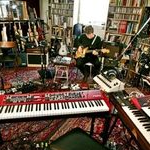 Next I'd like to take a little time to ponder about my future in music. I find this hard to discuss, since I'm a broken musician. Honestly it feels as if I fell all the way to the bottom of the pit. I've neglected my Juno-D (which still works but some keys are unresponsive) ever since I got my guitar, but I'd really like to go back to practicing a daily minimum of 20 minutes, as I have on my strings. It would be nice to get more comfortable with scales, but I'd also like to practice existing songs more seriously. In prior years I've only been interested in playing my own tunes, hence why I barely learned anything new. After all, the thought of it reminded me of music lessons as a kid and it bored me to death. Maybe when I get a little better on the guitar I'll think of entering a band, but we'll see. For now I want to practice while I work on my composition skills and knowledge. If things don't work out I'll think of picking up piano lessons. As for long-term goals, I'm still thinking of releasing an album and to invest in equipment/instruments. I posed myself the question: "If I had the skills to make any type of music in the world, what would I do?" I had a hard time answering that question but I'm fairly certain I would go and do paid commissions, especially for game developers. I would also consider making soundtracks for ambitious indie animations. As a kid I loved to sing and I even performed but I forgot about that passion somehow. The Pixies rekindled that flame, and now I'd love a chance to sing in a band. Furthermore I love improv and developed a taste for jazz and alternating time signatures, so that's something I'd definitely experiment with.
Next I'd like to take a little time to ponder about my future in music. I find this hard to discuss, since I'm a broken musician. Honestly it feels as if I fell all the way to the bottom of the pit. I've neglected my Juno-D (which still works but some keys are unresponsive) ever since I got my guitar, but I'd really like to go back to practicing a daily minimum of 20 minutes, as I have on my strings. It would be nice to get more comfortable with scales, but I'd also like to practice existing songs more seriously. In prior years I've only been interested in playing my own tunes, hence why I barely learned anything new. After all, the thought of it reminded me of music lessons as a kid and it bored me to death. Maybe when I get a little better on the guitar I'll think of entering a band, but we'll see. For now I want to practice while I work on my composition skills and knowledge. If things don't work out I'll think of picking up piano lessons. As for long-term goals, I'm still thinking of releasing an album and to invest in equipment/instruments. I posed myself the question: "If I had the skills to make any type of music in the world, what would I do?" I had a hard time answering that question but I'm fairly certain I would go and do paid commissions, especially for game developers. I would also consider making soundtracks for ambitious indie animations. As a kid I loved to sing and I even performed but I forgot about that passion somehow. The Pixies rekindled that flame, and now I'd love a chance to sing in a band. Furthermore I love improv and developed a taste for jazz and alternating time signatures, so that's something I'd definitely experiment with.
- Reasons To Create: I met a female electronic musician in 2011 who had me listen to some top quality tracks she made. Her songs were instrumental and represented emotions which she wished to convey. There's a handful of other musicians who have the same musical process and I'd love to do this myself. Most albums I know have random tracks on them but I find it way cooler when a compelling story is told.
- Creative Developments: Making music became harder to do. Not only did I strain the composition process by avoiding what I deemed musical clishés, but the outcome needed to contain an overall je-nais-se-quoi. Part of me was pushing to finish my songs, while other parts realized I couldn't rush it. Sometimes I didn't know what to do anymore.
- Outcome: Autodidacticism took its toll on me. I knew my musical methods were wrong in many ways but I was simply blind to the cure. This caused my learning curve to stagnate. The insecurity that followed may be ascribed to the lyrical and personal nature of some songs, but the lack of my expertise seemed much more likely. Either way, I was no longer proud of my musicianship and hoping to revive that spark.
"Also, it's not necessarily just using a ii-V-I prog in music, but building and molding it into something complex and unique, which is also extremely difficult to do. People take pop way too much for granted."
"Mechanical learning, i.e. learning by sight and by ear, can be a faster way of picking up an instrument. A lot of my piano and percussion is done by ear (as is a lot of my instrumentation in general). Picking up something by ear is also advantageous in the sense that you get to hear the expression with which something is played, instead of relying solely on the guidance of the sheet. You can hear the loud and soft, the slow and fast. A lot of contemporary pieces are best picked up by this method, and it is also likely the method by which music is passed on from generation to generation. It’s just… natural, I suppose?"
[INDEX]
- AN EMPTY STAVE
- THE BRIDGE
- IMPROV
- A RIG RUNDOWN
- TRANSITION
Zero2562130
Worthless Flash. FancyBear, the GRU-stemming hacking group, already admitted to doing so.
Try listening to actual news next time.